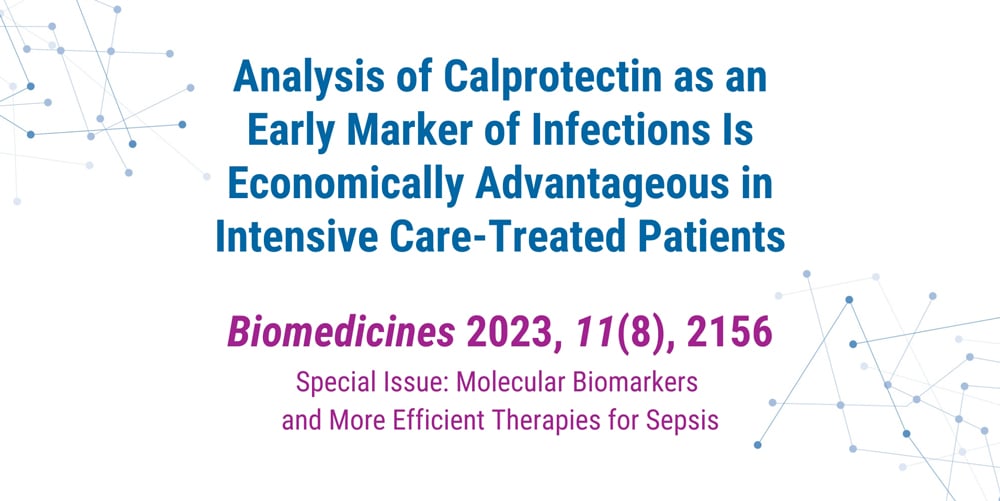
Early detection of bacterial infections for improved patient management in the ICU
Cost-effectiveness of calprotectin in early diagnosis of bacterial infections in intensive care patients has been studied in a health economic analysis recently published in Biomedicines. Gentian's plasma and serum calprotectin immunoassay GCAL® was used in the study. Below we highlight key elements from the study and the publication. You can read the full article here.
Background for the study
The estimated number of sepsis cases in 2017 was nearly 50 million globally, and there were around 11 million sepsis-related deaths1. Deaths in severe sepsis and septic shock are not limited to the acute phase but remain high even three months after diagnosis2. One of the most important aspects of the management of patients with sepsis is early recognition so that the administration of antibiotics, source control measures, and effective resuscitation strategies can be initiated as soon as possible3.
Early administration of antibiotics is associated with improved outcomes in sepsis and septic shock. Every 1 hour delay in antibiotics after emergency department (ED) triage or the onset of organ dysfunction or shock may lead to a 3–7% increase in the odds of a poor outcome4,5,6. A quality improvement program has resulted in a significant reduction in in-hospital sepsis cases and sepsis mortality and yielded a considerable positive return on investment7, showing that improvements can be achieved. Cost-effective biomarkers with rapidly available results around the clock and high specificity and sensitivity could improve the management of septic patients.
Calprotectin in the ICU for early detection
Calprotectin is present in high concentrations in the cytoplasm of neutrophils and is released into the circulation upon neutrophil activation without the requirement for de novo synthesis.
Several studies have confirmed the fast release of calprotectin upon inflammatory stimuli and earlier detection of calprotectin in circulation compared to procalcitonin (PCT) and C-reactive protein (CRP)8,9.
Calprotectin, analysed at admission to the intensive care unit (ICU), has a high sensitivity for bacterial infections in severely ill patients and has predictive value for mortality10-12. Previous studies confirm the value of calprotectin in the identification of bacterial infections, with better sensitivity and specificity than CRP and PCT10,11,13,14. Moreover, calprotectin was superior to PCT when patients with and without bacterial sepsis were distinguished11.
The hypothesis
Based on the results from previous studies, the hypothesis was that identifying patients with severe infections/sepsis at an early stage using calprotectin would be beneficial for patients and healthcare providers and economically superior to other commonly used biomarkers.
Thus, the study objective was to explore the health and economic implications of calprotectin as a predictive tool to initiate antimicrobial therapy in a cohort of critically ill patients. Data obtained from a previously published study on calprotectin as a hypothetical early biomarker of bacterial infections in critically ill patients were evaluated regarding the potential cost-effective impact of early analysis of calprotectin on an earlier start of antibiotic treatment.
Impact for patients and healthcare providers
Under the assumption that calprotectin is used predictively, and comparators are used diagnostically, a cost-effective impact of EUR 11,000–12,000 per patient would be obtained. In addition, predictive use of calprotectin can reduce both mortality and the length of hospital stay. Also when varying key model inputs (comparators, length of stay and cots-assumptions) for sensitivity analysis, calprotectin remains the dominant option.
This health economic analysis on the predictive use of plasma calprotectin that facilitates clinical decision making in cases of suspected sepsis, indicates that such determination has a cost-saving and life-saving impact on the healthcare system.
Read the publication here.
Results from this study has also been published as posters in conferences in Europe and USA in 2023.
GCAL® - Plasma and serum calprotectin
GCAL® for measurement of calprotectin in plasma and serum in the assessment of inflammation and inflammatory response to infection. The GCAL® assay is a novel Particle-Enhanced Turbidimetric Immunoassay (PETIA) that can be applied on a wide range of automated clinical chemistry analysers.
The GCAL® immunoassay is developed and manufactured by Gentian. GCAL® is CE-marked and IVDR certified. The assay might not be registered for use in your country of residence and may not comply with applicable laws or regulations in that country. The assay is not cleared for use in the USA.
Contact us for further information
Interested in plasma and serum calprotectin? Want to know more? Please send an email to marketing@gentian.com or fill out the form below:
References:
- Rudd, K.E.; Johnson, S.C.; Agesa, K.M.; Shackelford, K.A.; Tsoi, D.; Kievlan, D.R.; Colombara, D.V.; Ikuta, K.S.; Kissoon, N.; Finfer, S.; et al. Global, regional, and national sepsis incidence and mortality, 1990–2017: Analysis for the Global Burden of Disease Study. Lancet 2020, 395, 200–211.
- Strandberg, G.; Walther, S.; Agvald Öhman, C.; Lipcsey, M. Mortality after Severe Sepsis and Septic Shock in Swedish Intensive Care Units 2008-2016-A nationwide observational study. Acta Anaesthesiol. Scand. 2020, 64, 967–975.
- Vincent, J.L.; Pereira, A.J.; Gleeson, J.; Backer, D. Early management of sepsis. Clin. Exp. Emerg. Med. 2014, 1, 3–7.
- Kumar, A.; Haery, C.; Paladugu, B.; Kumar, A.; Symeoneides, S.; Taiberg, L.; Osman, J.; Trenholme, G.; Opal, S.M.; Goldfarb, R.; et al. The duration of hypotension before the initiation of antibiotic treatment is a critical determinant of survival in a murine model of Escherichia coli septic shock: Association with serum lactate and inflammatory cytokine levels. J. Infect. Dis. 2006, 193, 251–258.
- Kumar, A.; Roberts, D.; Wood, K.E.; Light, B.; Parrillo, J.E.; Sharma, S.; Suppes, R.; Feinstein, D.; Zanotti, S.; Taiberg, L.; et al. Duration of hypotension before initiation of effective antimicrobial therapy is the critical determinant of survival in human septic shock. Crit. Care Med. 2006, 34, 1589–1596.
- Ferrer, R.; Martin-Loeches, I.; Phillips, G.; Osborn, T.M.; Townsend, S.; Dellinger, R.P.; Artigas, A.; Schorr, C.; Levy, M.M. Empiric antibiotic treatment reduces mortality in severe sepsis and septic shock from the first hour: Results from a guideline-based performance improvement program. Crit. Care Med. 2014, 42, 1749–1755.
- Khowaja, A.R.; Willms, A.J.; Krause, C.; Carriere, S.; Ridout, B.; Kennedy, C.; Young, E.; Mitton, C.; Kissoon, N.; Sweet, D.D. The Return on Investment of a Province-Wide Quality Improvement Initiative for Reducing In-Hospital Sepsis Rates and Mortality in British Columbia, Canada. Crit. Care Med. 2022, 50, e340–e350.
- Fullerton, J.N.; Havelka, A.; Segre, E.; De Maeyer, R.P.; Maini, A.A.; Gilroy, D.W. Kinetics of Calprotectin, Procalcitonin and C-Reactive Protein in Healthy Volunteers Administered Intravenous Endotoxin. Available online: https://ccforum.biomedcentral.com/articles/10.1186/s13054-020-2772-3 (accessed on 1 April 2023).
- Lipcsey, M.; Hanslin, K.; Stålberg, J.; Smekal, D.; Larsson, A. The time course of calprotectin liberation from human neutrophil granulocytes after Escherichia coli and endotoxin challenge. Innate Immun. 2019, 25, 369–373.
- Simm, M.; Söderberg, E.; Larsson, A.; Castegren, M.; Nilsen, T.; Eriksson, M.; Lipcsey, M. Performance of plasma calprotectin as a biomarker of early sepsis: A pilot study. Biomark. Med. 2016, 10, 811–818.
- Larsson, A.; Tydén, J.; Johansson, J.; Lipcsey, M.; Bergquist, M.; Kultima, K.; Mandic-Havelka, A. Calprotectin is superior to procalcitonin as a sepsis marker and predictor of 30-day mortality in intensive care patients. Scand J. Clin. Lab. Investig. 2020, 80, 156–161.
- Jonsson, N.; Nilsen, T.; Gille-Johnson, P.; Bell, M.; Martling, C.R.; Larsson, A.; Mårtensson, J. Calprotectin as an early biomarker of bacterial infections in critically ill patients: An exploratory cohort assessment. Crit. Care Resusc. 2017, 19, 205–213.
- Bartáková, E.; Štefan, M.; Stráníková, A.; Pospíšilová, L.; Arientová, S.; Beran, O.; Blahutová, M.; Máca, J.; Holub, M. Calprotectin and calgranulin C serum levels in bacterial sepsis. Diagn. Microbiol. Infect. Dis. 2019, 93, 219–226.
- Havelka, A.; Sejersen, K.; Venge, P.; Pauksens, K.; Larsson, A. Calprotectin, a new biomarker for diagnosis of acute respiratory infections. Sci. Rep. 2020, 10, 4208.
Conflicts of Interest
This website may contain information about products that are not registered for use in your country of residence and may not comply with applicable laws or regulations in that country. We do not take any responsibility for accessing such information in those circumstances.


-1.jpg)
.png)